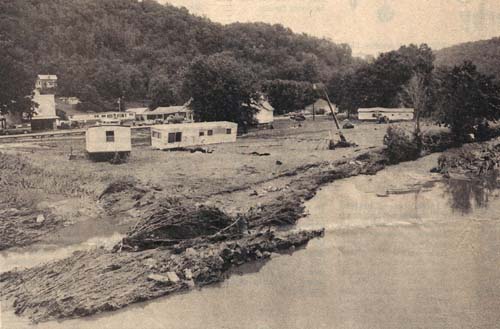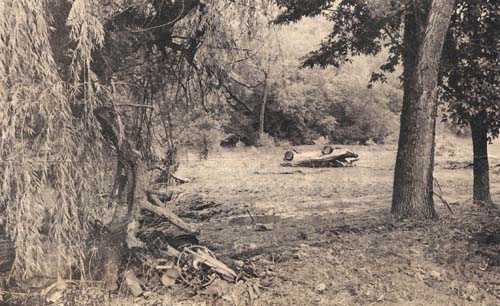![]()
Dorchester Flood 1978 |


Trailers and a car were among the victims of the flash flood on Waterloo Creek at Dorchester early Saturday morning. Both scenes are on the flood plain of the community of Dorchester itself. Dorchester's main street was covered by as much as three feet of water at the crest.
Extensive Damage in Dorchester Area as Creek Overflows
ON THE SCENE! The editorial staff of Waukon Newspapers didn’t have far to go to research the accompanying story about the flooding in the northern part of the county and southern Minnesota. Employees Donna Teff and Bonnie Hager and their families were at Camp Winnebago; Marcus Smith and his wife were at Dunromin and LaVonne Lamphier and family at Pineview, where camp owners are Mr. and Mrs. Nathan Kumpf, and Mrs. Kumpf is the Dorchester correspondent for Waukon Newspapers. The story was written by Linda Montet from their reports in great measure.
Reports of extensive damage, loss of property and near tragedy filtered into Waukon from outlying areas in northern Iowa and southern Minnesota through the Fourth of July weekend as heavy rain and thunderstorms hit the area Friday night and sent creeks and rivers raging out of their banks during the first night of one of the busiest camping weekends of the year. Worst hit of the campgrounds seemed to be Pineview park at Dorchester, situated along Waterloo creek and owned and operated by Nathan and Irene Kumpf. About 60 units were parked in the campground, some remaining year-round, and when the water began to recede only ten were left in place. Some sleeping campers were aroused in time to save their belongings, but eleven trailers were swept away and demolished by the torrent, plus a couple of cars and other pieces of camping equipment.
The Kumpfs lost a trailer of their own to the flood and hosted campers throughout the night as water lapped at their doorstep. "There was about two feet of water going down the street," said Irene, adding that it is remarkable that no lives were lost.
The Harry Lamphier family of Waukon was asleep at the Dorchester park when they were awakened about 1:45 a.m. by noises of other campers trying to evacuate. The water was rising rapidly and some campers and cars were already stalled in the thick mud. "We heard the campers coming under the bridge, scraping and being demolished," remembers Lavonne Lamphier, after she and her family had narrowly escaped with their converted bus and two cars. "We watched trees that were uprooted, campers, gas drums, coolers, and more, float by us."
Tom Teff of Dorchester and his brother-in-law Jerry Berg of Cedar Rapids, who was camping at the campground, pulled many vehicles and camping trailers to higher ground with Tom’s tractor.
A mobile home owned by Tom Wandling was swept away, coming to rest on top of his car, and Mr. and Mrs. Gilbert Clausen of Clinton spent a frightening time floating down the stream in their pickup camper with water neck deep in the cab. They were rescued by boat as the truck snagged on a tree, not far from the Dorchester bridge.
SWEENEYS
Waters were rising north of Dorchester also, as tourists at Camp Winnebago near Caledonia, MN, were being drenched in the downpour. Sr. Raeleen Sweeney and her mother Ileen (Mrs. Ralph) Sweeney of Waukon had retired from an evening around the campfire when they were awakened by the deluge. They were nearer to Winnebago creek than the other campers and became concerned when they noticed water swirling near the top step of their trailer. When an attempt to reach a nearby tree failed they tied themselves together with a sheet and again left the camper. Swept off their feet by the raging water, the two were carried violently downstream for nearly a half-mile amid uprooted trees and brush. They tried to grab onto branches as they passed, but these were torn out of their hands as they bobbed in the current. Then, as suddenly as they were carried away, the women were tossed on the bank, still holding their flashlights and in a state of near-shock."It was as if we were being pulled along by a speedboat," recalls Sr. Raeleen, "and we were screaming and praying for help." Both she and her mother are strong swimmers and they are certain that their experience in the currents of the Mississippi river helped to save them. "It’s just a miracle we’re still alive," she added, still shaky from the experience Monday morning.
The Harry Teff family of Waukon, also camped at Winnebago, was aroused by Sr. Raeleen’s pounding on their door after she and her mother had crawled up the bank to a shelter house and had begun to alert the other campers. "There’s no way to explain the panic one feels when someone tells you to move your camper or it will be washed away by a flood," says Donna Teff. She and her oldest son, Kim, watched out the window as huge trees rushed past in the flood waters, unable to hear anything but the pounding rain. The ground was so soft that it became almost impossible to walk without sinking and high water made it impossible for help to reach the stranded units.
"We didn’t know it then," says Bonnie Hager of Waukon, who was parked a short distance from the Teffs with her husband Jim and her son, "but there was no way the camp managers could warn us of the unexpected flood because the telephone lines were out, and the weather information wasn’t getting through."
The cars became bogged down in the mud as they tried to move the trailers to higher ground, but one of the campers, Ralph Anderson of Waukon, had a four-wheel drive vehicle and it was able to move the others to safety. "No one slept the rest of the night," Bonnie remembers. "The men watched the flood conditions, and the women congregated in a camper and calmed nerves with coffee. The younger children slept through the whole thing."
Wilbur "Bub" Rose and the Randy Sweeneys of Waukon were also camped in that area of the park and had to move their campers.
Winnebago creek is a calm, quiet stream which is usually about of ankle depth. Weekend campers at Dunromin park, near Winnebago, were stranded at the site as two bridges washed out preventing anyone from entering or leaving until about noon Saturday. Some property damage was reported at that park also.
SCHOOL
In Dorchester damage was reported to the elementary school grounds as a protective dike on the west side of the building was partly washed away, ruining a hedge and washing sand and boulders onto the schoolyard. Principal Charles Lonning said that a sewer building was filled with mud and equipment contained therein was damaged by the circling water and mud. The building was undermined and almost collapsed, but will be repairable.Water also went into the bus barn, forcing its way through a door, and three feet of water caused oil barrels to upset, damage to a garden tractor and sludge to cover the equipment, Lonning said. The school building itself has no basement, but there was some flooding in the boiler room and mud, sand and dirt remained when the water receded.
According to Allamakee Community Schools Administrative Assistant M.F. Whitney, a great deal of debris was caught on the swings and slide in the playground area and large logs, rocks, sand and dirt were deposited on the lawn, but the building did not receive much damage. "As far as we can see now," he reports, "there is no insurance coverage," but officials are still looking into the possibility of some coverage on the equipment.
No arrangements have yet been made for cleanup, but it is likely that most of it will be done by custodians, likely putting them behind schedule in their other work. It may be necessary to hire some outside help.
Civil Defense Director Ernest Luster was at the Dorchester scene, and reported that the Eitzen and Spring Grove fire departments began pumping water from basements about 4 am. "We have equipment in each town for such things," he said, adding that the job was difficult because the water came back in almost as fast as it was pumped out. "There was just no place for the water to go."
ENGINEER
Damage to roads and bridges was not as bad as might be expected, reports Allamakee County Engineer Bill Kerndt, and was confined mostly to an area north of the Upper Iowa River. The Dorchester bridge was the only county bridge damaged, and it was fortunate that enough debris was caught on the structure to divert the force of the water across an approach on the south end. An area 10 feet wide and 12 feet deep was in the process of being replaced Monday. A lot of rock, dirt and sand slides were reported, says Kerndt, and ditches and culverts were filled with rock and debris. One of the worst rockslides was on a gravel road into Minnesota near New Albin. About 15 men were diverted from other county road projects to work on the flood repair.Crop damage was confined to the bottomland around Waterloo creek, according to Allamakee County Extension Director Lee Gruenhaupt, due to the heavy rains in Minnesota. He said that some fields seem to have one-third to one-half of their plants affected, but final damage will depend on the size of the corn at the time it was flooded.
Although most of the weekend happenings were sobering to those in the middle of the flooding, Irene Kumpf points out that a few humorous incidents were noted, too. Among other things, a carton with a dozen unbroken eggs was found in the aftermath, and a sealed pitcher of lemonade survived the trip out of a lost camper in perfect condition.
~Waukon Democrat, Waukon, IA, 06 July 1978
~transcribed by Errin Wilker
~*~*~